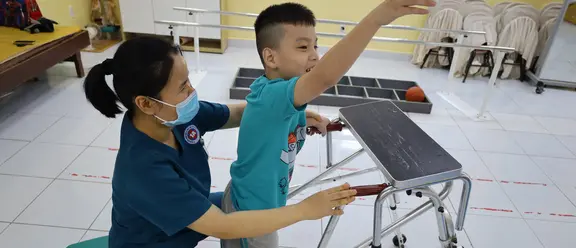Vietnam: Help for children with disabilities
From 1961 to 1971, the US military in Vietnam used around 82 million liters of Agent Orange and other defoley as part of the so-called Operation Ranch Hand. To date, the consequences of this use are still considered the cause of birth defects, cancer and nerve disorders. Around three million Vietnames suffer from diseases that are due to the chemical. In addition to the numerous cases of miscarriages and the mortality of newborns, there are around 150,000 children who were born with disabilities as a result of Agent Orange. The number of children with physical and mental restrictions in Vietnam is currently estimated at around 200,000.
Families in which children or family members live with physical disabilities have greater difficulties to make a living. At least one family member (usually the mother) has to stay at home to take care of the children. This means that the family is lost an "income recipient". As soon as a child shows symptoms of illness (usually in the first year of life or in the newborn phase), the families are forced to sell almost all assets and agricultural areas to cover the medical costs.
The orthopedic and rehabilitation hospital Ho-Chi-Minh-Stadt (formerly the Center de Réhabilitation of the Paraplégiques Crep Enfants) is the largest center for functional rehabilitation for children with disabilities in Vietnam. Here physically disabled children are treated free of charge medically and therapeutically. You learn to use your skills and receive prostheses, walking aids or wheelchairs. Up to 350 children can be recorded inpatient.
Also in the city center of Ho Chi Minh City is the center for malnourished children (Crom). Pereal children have been administered here for over 30 years. Poverty, especially in rural regions, is the cause of the deficiency symptoms. The children suffer from respiratory diseases, skin diseases and paralysis. The Crom employees put the little ones up again with patience and love. The parents will advise what needs to be done so that everyone has enough to eat in the future. Education of the population, training and further education of specialists and working in rural areas are another important task of the CROM.
